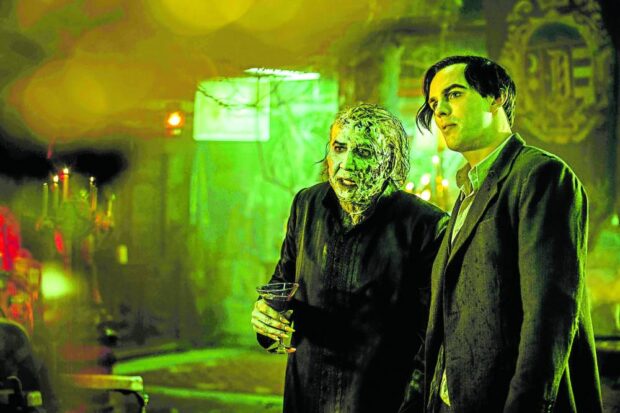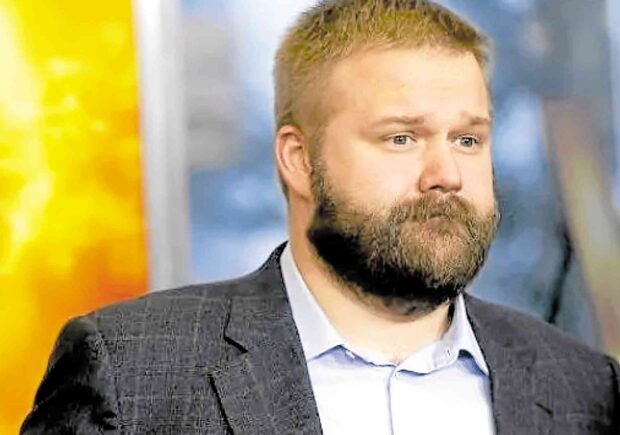
Nicolas Cage (left) as Dracula and Nicholas Hoult as Renfield —PHOTO COURTESY OF UNIVERSAL PICTURES INTERNATIONAL
We’ve always been fascinated by “The Walking Dead” creator Robert Kirkman, not only because of the compelling stories he brings to life, but also because of the clickbait situations he occasionally gets himself embroiled in.
What immediately comes to mind are his former legal battles with the zombie comic-book series’ original artist Tony Moore, who illustrated “The Walking Dead’s” first six issues, and Robert’s profits claims case against its TV iteration’s other producers.
As an interviewee, however, Robert is actually such a joy to talk to. When we spoke to him about the horror-comedy film “Renfield,” which, as we write this, is on its second week in select SM Cinemas and Ayala Malls outlets, he pretty much lived up to our larger-than-life impression of him.
“Renfield” is directed by Emmy winner Chris McKay (“The Lego Batman Movie”) from a story by Robert and a screenplay by Ryan Ridley (“Ghosted,” “Rick and Morty” series). In this modern monster tale about Dracula’s loyal servant, Nicholas Hoult is cast as the tortured aide to history’s most narcissistic boss.
But after centuries of undying servitude, Renfield is finally ready to explore a life away from the Prince of Darkness—if he can figure out how to end his codependency issues!
Robert laughed heartily when Inquirer Entertainment asked him where his fascination with blood, gore and the undead was coming from.
“I’ve been fortunate enough to tag along with the rich history of universal monsters,” he said. “So this isn’t necessarily a whole monster world that I’m creating. I just get to play in a sandbox that was already there—and there’s been a ton of brilliant things done with it over the many, many years since it first came out.
“My fascination with blood and gore and zombies just comes from the fact that I love being surprised and shocked. That’s the thing I want out of entertainment… I want to be taken off guard. I want to have that numb feeling of being like, ‘Oh my God, I didn’t expect this to happen. And now, we’re in uncharted territory’—and anything can happen from this point on.
“Horror gives you a great palette to accomplish those things, be it jump scares or insane gore that comes out of nowhere or startling character deaths. It’s a genre that is ripe with all kinds of tricks and tools that, as a storyteller, you can play with, move around and do some cool stuff with.”
Our Q&A with Robert:
Letting Nicolas Cage play Dracula is a great idea. Were you aware of the funny rumors about him being a real vampire? In 2012, David Letterman even asked the Oscar-winning actor in an interview about a photo of a guy from 1870 that bears a striking resemblance to Nick—who denied the rumor by saying, “I don’t drink blood.”
I’ve seen those pictures, so yeah, Nicolas might be a real vampire (laughs). Look, Dracula is one of the most iconic characters to have ever existed, and the only way to enhance something that’s already known is to have Nicolas Cage come up with his own absolutely brilliant portrayal. So I couldn’t be more thrilled to be working with one of the coolest and oldest real vampires to have ever existed.
How did the codependency angle in the story come about? Would you be interested in applying psychotherapy concepts to more horror stories in the future?
I may not be smart enough to apply more psychotherapy elements to horror stories moving forward, but this codependent relationship was something that was naturally there between Renfield and Dracula. And this was accentuated and expanded upon when Ryan came in to write the script, based on my treatment for the original idea.
It’s a cool and unique way to experience this relationship, but it’s also something that is sadly very relatable because, at some point, I think we’ve all encountered some toxic relationships in our lives.
Aside from Dracula. are there other classic monsters you want to see in a new horror movie?
I have an affinity for almost all of them. I mean, Frankenstein’s monster is great. I love the “Creature from the Black Lagoon.” I’m a huge fan of all forms of the Mummy. I also think there’s great potential for the Wolfman and all the others. They were the original horror movies—in fact, they were the original shared universe.
A lot of your previous stuff has been about the undead and the horror genre, but there’s always a sense of humor in there. Why do you think horror and comedy balance each other out and blend so well?
To a certain extent, they’re kind of two sides of the same coin. When you’re watching something that’s absolutely hysterical and funny, and when you’re experiencing something that’s scary, it’s almost the same feeling leading up to those moments. Then, it diverges into funny or scary at some point along the way.
They’re finding that nebulous area where we’re being pulled out of our comfort zone. We’re not constantly laughing, and we’re not constantly feeling terror. We have this neutral feeling that we always exist in these two heightened states that are always out there. And they’re so married to each other.
You can see this in a tremendous amount of movies, like “Evil Dead 2” or “Shaun of the Dead”—you can have elements that can be scary, as well as elements that are funny. When done right, it works really well.
Did you make some changes to the script when you learned that Nicolas agreed to play Dracula?
I’ve been in this business for a while now—I’m very old (laughs). And I’ve learned from working on “The Walking Dead” and various other projects that actors bring so much to these roles.
Working in comic books and writing scripts, it’s words and drawings on a page. You don’t really have that relationship where someone is coming in and interpreting your words or characters in unique ways.
So, when I’m developing something, I don’t spend a lot of time trying to shoehorn an actor into my mind to help me visualize the character. I can visualize characters pretty well, and it’s more exciting to me to get to that point where an actor is brought in and I see what they bring to it.
For the longest time, it was like, “OK, we’re going to have a cool Dracula, and he’s going to antagonize Renfield this way.” But when we got to the casting process and Nicolas actually got on board, that’s when things got really exciting because you see his preparation and what he brings to the table.
As far as rewriting and tailoring things for Nicolas, that was something that Ryan and Chris worked very diligently to accomplish. But Nicolas also came in with a ton of ideas that shaped the role all the way down to the dialogue, which was tailor-made for him. That’s why the character is so effective and his portrayal, so memorable. INQ


